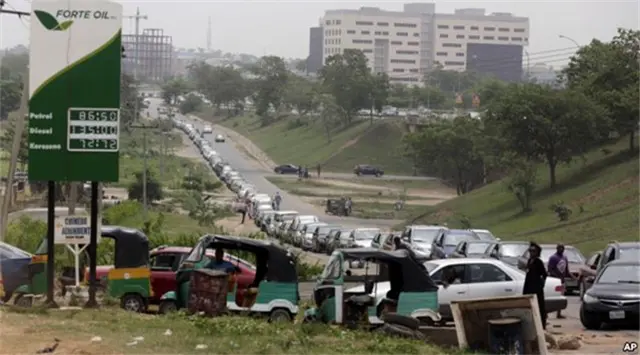The Nigeria Labor Congress (NLC), the umbrella body for workers in the country, on Wednesday commenced its proposed nationwide strike over the new price regime for fuel introduced by the government last week.
The NLC leaders walked out on government representatives after a two-day meeting which ended in stalemate on Tuesday and defied an order by a local industrial court which restrained it from the protest.
For the labor union, however, it is a "lonely ride", as civil servants and workers in the private sector shunned the nationwide protest and opened offices for business.
The Nigerian government had issued a directive on Tuesday, enjoining all workers, in public and private sector to shun the protest.
In the directive signed by the secretary to the government of the federation, Babachir Lawal, the government reminded the workers of the Trade Dispute Act (2004) which provides that "where any worker takes part in a strike, he shall not be entitled to any wages or remuneration for the period of the strike".
In Abuja, the Nigerian capital city, leaders of the labor union on Wednesday mobilized a peaceful protest to the federal government secretariat, describing the increment in price of domestic fuel, by over 67 percent, as "anti-people".
Ayuba Wabba, national president of the NLC, on Wednesday said the hike in fuel price would bring about inflation and prayed to the government to reverse its decision.
"If policies are right, we will support it; but if policies are anti-people, we will continue to resist," he said, adding it was logical to conclude that once the cost of petrol goes up in a country like Nigeria, the cost of goods and services will also go up.
However, the Nigerian government said the new price, introduced a week ago with immediate effect, was in the interest of the country, as the government could no longer afford the foreign exchange spent by the state-run Nigerian National Petroleum Corporation (NNPC) to import petrol.
Due to the fall in the price of crude oil in global market, Nigeria's earnings had dropped to about 550 million U.S dollars in April, while the amount required for fuel importation alone is about half that amount.
Minister of Information, Culture and Tourism Lai Mohammed told reporters in Abuja that it would get to a point where the country will be completely broke if it continued along that line.
"That is why this policy has become absolutely necessary, and we have no option," he said.
In a statement, the labor union advised the government to jump- start the economy by using petroleum refining as a fulcrum by investing heavily on the downstream sector, rather than "dissipating energies on price differentials of petroleum products imported from Europe".
Mohammed said the Nigerian government was aware that the introduction of a new fuel price might bring suffering, but "this will last for a very short time".
"It is only going to be a temporary hardship because the moment we liberalize and open up the market, there will be competition and the price will come down and there will be petrol glut," he added.
He said the government would ensure that the refineries which are already working, work to optimized capacity in efforts to make Nigeria a net exporter of fuel and other petroleum products by 2019.
(APD)
 简体中文
简体中文

